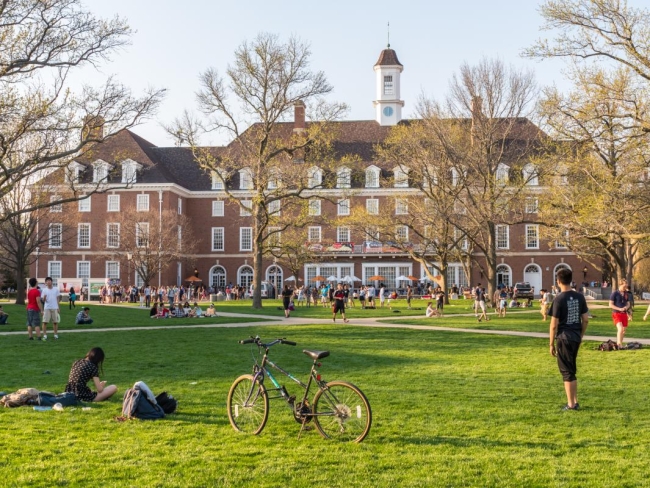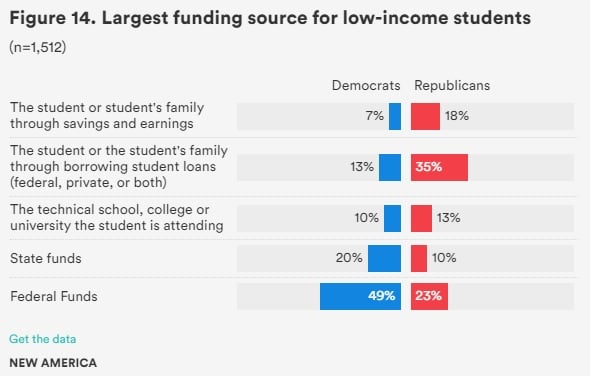You have /5 articles left.
Sign up for a free account or log in.

istock.com/leightrail
Americans are divided based on race, political party and age in their views of such fundamental questions about higher education as its value and who should pay for it, according to the results of a New America survey.
The fourth annual report by the left-leaning Washington, D.C., think tank found that in general Americans appreciate the value of higher education. The survey found that 82 percent of respondents said those who pursue it will have more job opportunities, with 80 percent believing that pursuing education beyond high school offers a good return on investment.
Only 17 percent of the 1,512 Americans age 18 and older who responded in mid-February, before the wide shutdowns due to the pandemic, said they thought their family members should only pursue a high school education, the study said.
But Black and Latino respondents, as well as younger people, are less likely than those from other racial groups to have faith that going to college will let them get ahead or that it is worth the money.
For instance, New America found that 86 percent of whites and 89 percent of Asian Americans believe that those who pursue higher education will have more job opportunities than those who do not.
But only 69 percent of Black people surveyed and 74 percent of Latinos agreed.
The study also found generational differences. Nearly all of those in the generation preceding baby boomers, 99 percent, thought higher education brings economic mobility. Ninety-five percent of baby boomers agreed.
However, only 88 percent of millennials believe that going to college brings economic mobility. And just 71 percent of millennials believe higher education brings a good return on investment, compared to 81 percent of baby boomers.
The survey also displayed differing opinions of the value of for-profit colleges based on race. Only slightly more than half of whites and Latinos, 56 percent and 59 percent respectively, said that for-profits contribute to a strong workforce. Among Black respondents, 70 percent agreed with that statement. About a half of Blacks said they view for-profits as being for people like them, while only a third of whites felt the same way.
Rachel Fishman, New America’s deputy director for education policy research and one of the study’s authors, attributed the lower faith among Black and Latino respondents to barriers faced even by college graduates.
"We know that due to systemic racism faced by Black and Latinx populations, the payoff to higher education is not as high," she said in a statement. "From issues regarding inequality in access to housing in neighborhoods with high-quality K-12 schools to labor market discrimination, higher education can only do so much to mediate enormous racial wealth gaps that are rooted in institutionalized racism."
The New America study noted it found far more positive views on higher education, particularly among Republicans, than an oft-cited 2019 Pew survey. That survey found only half of those surveyed felt colleges had a positive impact on the country’s direction, including only 36 percent of Republican and GOP-leaning respondents.
The New America researchers who co-authored the report, Fishman, Sophie Nguyen and Myra Francisco, said differences between the surveys could be based on how they were conducted or that Republican views on higher education are more nuanced than either poll captured.
The New America survey, however, did find fundamental differences over whether funding higher education is primarily the responsibility of the government or of the students who’d benefit from it.
Over all, 63 percent of those surveyed said responsibility to fund higher education should fall mainly on the federal government, instead of students or their families.
That view was held by a large majority of Democrats, 80 percent. However, the majority of Republicans, 60 percent, held the opposite view -- that those who’d gain from getting a degree are primarily responsible for paying for higher education.
The study also found starkly different views over what share of the cost of low-income students attending college should be borne by the federal government, instead of students.
Among Democrats, the largest response at 50 percent, was that the federal government should pick up the biggest share of the cost. A plurality of Democrats said the smallest piece of the cost should be borne by students and their families.
A third of Republicans, and the largest response, said students or their families should pay the biggest share by taking out loans.




